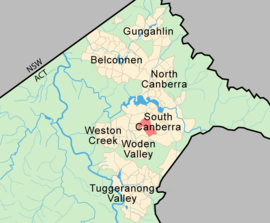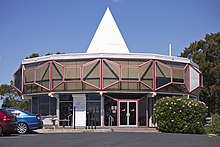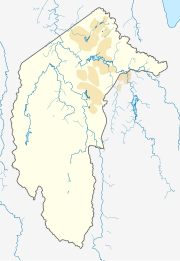Red Hill, Australian Capital Territory
| Red Hill Canberra, Australian Capital Territory | |||||||||||||||
|---|---|---|---|---|---|---|---|---|---|---|---|---|---|---|---|
 | |||||||||||||||
| Coordinates | 35°19′59″S 149°07′59″E / 35.333°S 149.133°E | ||||||||||||||
| Population | 3,249 (2011 census)[1] | ||||||||||||||
| • Density | 645/km2 (1,670/sq mi) | ||||||||||||||
| Established | 1928 | ||||||||||||||
| Gazetted | 20 September 1928 | ||||||||||||||
| Postcode(s) | 2603 | ||||||||||||||
| Area | 4.87 km2 (1.9 sq mi) | ||||||||||||||
| District | South Canberra | ||||||||||||||
| Territory electorate(s) | Molonglo | ||||||||||||||
| Federal division(s) | Canberra | ||||||||||||||
| |||||||||||||||
Red Hill (postcode: 2603) is a suburb of Canberra, Australian Capital Territory, Australia. The suburb is named after the northernmost hill of the ridge to the west of the suburb. The ridge is a reserve and managed as part of the Canberra Nature Park. The hill is an element of the central Canberra design axis.
History
The name 'Red Hill' was gazetted as a suburb name in 1928. This was the name associated with the hill since the days of the early settlers and probably suggested by the red soil in the area. Streets are named after ships and explorers.[2] Mugga Way is named after an Aboriginal word also associated with the locality since the days of the early settlers.
The hill was once part of the Narrabundah lease held by Charles Russell. He grazed sheep but as the suburb became built up, local pet dogs worried them and killed them. He changed to cattle and finally gave up the lease in 1992.
The Red Hill Precinct or "Old Red Hill" is bounded by Mugga Way, Moresby Street, Arthur Circle, Monaro Crescent and Flinders Way. The major streets of this area were included in an outline plan for the early development of Canberra prepared by Walter Burley Griffin in 1918. Its streetscape and landscape character reflect 1920s garden city planning. It is listed by the ACT Heritage Council.[3]
Residential land in the suburb of Red Hill was offered for sale in the first Canberra land auction conducted on 12 December 1924. By 1929, 22 houses had been built and by 1955 there were 64 houses.
Other sites in Red Hill listed by the ACT Heritage Council are:
- Calthorpes' House.[4]
- The Royal Australian Institute of Architects Headquarters, 2a Mugga Way, which was designed by Bryce Mortlock of the Sydney firm, Ancher, Mortlock and Woolley in 1967.[5]
- The Canberra Grammar School, which was built between 1929 and 1939 in the Inter-war Gothic style.[6]
- 145 Mugga Way. According to the ACT Heritage Council, the house is considered to be an "excellent example of the late twentieth century Sydney Regional style of architecture by Allen Jack+Cottier (Russell Jack) who are considered to be key practitioners in the style."[7]
Suburb amenities

Canberra Nature Park: Red Hill

Red Hill's most important recreational area is the hill itself. From the Canberra Times Letters to the Editor in May 2000 one resident said:
- "Most Sundays I walk on the slopes of Red Hill in bush that is not pristine, not especially beautiful, but that is there close to where I live, a bit of bush rather than town earth and rock, not bitumen. There is a variety of birds, a miscellany of trees, some of them exotics, a range of weedy but pretty flowers, no doubt snakes, and certainly kangaroos. Ironically, a month ago I saw more kangaroos (a mob of 14) on Red Hill in the centre of Canberra than I saw subsequently during the entirety of a 16-day tour of the Red Centre. This Red Hill bush it can't be called wilderness makes Canberra a better place to live for the many people who do walk there and enjoy its qualities. "
Schools

Red Hill has a local public primary school and a government pre school located in the same building complex. The Red Hill School is an accredited IB World School. There is also a Catholic primary school, St Bede's Primary School, and the Canberra Grammar School, an Anglican school for boys, and a French-Australian preschool.
Red Hill residents get preference for:[8]
- Depending on the address: Red Hill Primary or Forrest Primary
- Telopea Park School (for high school)
- Narrabundah College
Notable places
Calthorpes' House
Calthorpes' House at 24 Mugga Way was built in 1927 by Harry Calthorpe, stock and station agent with the firm Woodgers & Calthorpe. Designed by the architectural firm of Oakley and Parkes, the house displays many characteristics of the Spanish Mission style. The family (Harry, his wife Del and two daughters, Del and Dawn) lived together in the house throughout the Depression and Second World War, when both girls married. After Harry's death in 1950, his wife continued to live in the house, mostly alone. While friends and neighbours redecorated their houses, she elder never did. After her death in 1979, it was recognised that an opportunity existed to preserve a house that related to Canberra's early years in staggering completeness, and the Australian Commonwealth Government bought the house, its garden and the house's contents from the two daughters in 1984.
The Australian Institute of Architects in its register of significant 20th-century architecture says the building is a rare, relatively unchanged example of a 1920s Australian home. Noting that it encapsulates family life of the time, it also points to the interior design and clinical appearance of the kitchen and bathroom, which "heralded the new social era".[9]
-
House from front garden
-
Back garden, including orchard
-
World War II air raid shelter in back garden
-
Air raid shelter interior
Boxford
A suburban garden named Boxford is divided into six separate sections, each reflecting the garden history and culture of a different part of the world. One of the gardens is in the Japanese style; another features a fountain inspired by chapel of Oscar Niemeyer in garden derived from the ideas of Burle Marx a Brazilian garden designer. The garden has been listed on the ACT Heritage Register.
-
Fountain
-
The Japanese garden
Major roads
The main access to the suburb from the south is from Hindmarsh Drive onto either Mugga Way or Dalrymple Street. The main roads through the suburb are La Perouse Street, Flinders Way and Monaro Crescent. The suburb's roads are named after ships and explorers.
Demographics
The first families moved to the suburb of Red Hill in 1927 and by 1933 the suburb had a population of 132 people. Its population peaked in 1971 with 4,100 residents. On Census night 2011, Red Hill had a population of 3,249 people,[1] a small increase from 3,143 in 2006[10] and 3,062 in 2001.[11] The population number has changed little over the last decade: in 2001 there were 16 fewer people than in 1996 (0.5% fewer); 32 more people than in 1991 (1% more).
The median age was 41 years;[1] an increase over the median age of 39 recorded in the 2006 census[10] and 37 years recorded in both the 1996 and 1991 censuses.
The mean household size was 2.7 persons.[1]
In the 2011 Census, there were 798 separate houses (72.3%), 129 semi detached, row or terrace houses and townhouses (11.7%), 177 flats, units or apartments (16.0%) and 0 other dwellings (0.0%).[1]
Of all occupied private dwellings in the 2011 Census, 693 were either fully owned or being purchased, which represents (67.0%) of all occupied private dwellings, while 371 (33.6%) were being rented.[1] This compares with 626 (57.1%) either fully owned or being purchased and 398 (36.3%) being rented in the 1996 Census, and 621 (57.6%) either fully owned or being purchased and 379 (35.2%) being rented in the 1991 Census.
These demographics compare with ACT census results of a median age of 34 years (30 years in 1996 & 29 years in 1991); mean household size of 2.6 persons; 72.8% of houses are separate dwellings and 67.3% of all occupied private dwellings were either fully owned or being purchased. Red Hill has a slightly older population, slightly smaller household size, a smaller proportion of houses are separate dwellings and more dwellings are rented in the suburb compared with Canberra on average.
Politics
|
| |||||||||||||||||||||||||||||||||||||||||||||
Red Hill is located within the federal electorate of Canberra. Gai Brodtmann currently (2014) represents the electorate of Canberra in the House of Representatives. Red Hill is part of the ACT electorate of Molonglo, which elects seven members on the basis of proportional representation, although the number of electorates and members are currently (January 2014) under review.[14] Currently Molonglo is represented by three Labor members, one Greens member, and three Liberal members.[15]
Polling place statistics are shown to the right for the Red Hill polling place in the 2012 ACT and the 2013 federal elections.
Geography

The Red Hill ridge forms the south-west boundary of the suburb. The ridge separates the central Canberra valley from Woden Valley. The northernmost peak is Red Hill, the Davidson Trig is on the middle point, and Mount Mugga is on the southernmost point of the ridge across Hindmarsh Drive.
The suburb occupies 4.87 km² and has a population density of 634/km².
Geology
The Red Hill ridge is said by geologists to be an "erosion residual" resulting from metamorphisis of sedimentary rock. The Yarralumla Formation sediments were toughened by thermal metamorphism from a small granite intrusion to the south thereby providing the resistant core of the ridge. The granite is deeply weathered and does not outcrop but is evident by the smooth slopes and deep red soils on the lower slopes to the north-west by the road to the Federal Golf Course.[16] This intrusion is known as Federal Golf Course Tonalite. It is dated at 417±8 Mya. It is completely crystalline with mineral content of plagioclase, hornblende, biotite and interstitial quartz and no potash feldspar.
The type of red soil is known as terra rossa.
-
Recently exposed soil. Red Hill gained the name from the colour of its soil.
-
This rock is from a still-standing metamorphic ridge
-
Small disused quarry on west side of the ridge
-
Exposed rock in disused small quarry, showing interesting weathering features
Rock location summary
Mount Painter Volcanics dark grey to green grey dacitic tuff is found in all except the west. This includes most of the built up area. Yarralumla formation outcrops on Red Hill down to Mugga Way. The Federal Golf Course hanging off the west side of Red Hill also counts as part of the suburb. It has a Silurian tonalite intrusion under the whole course referred to as granite above.
References
- ^ a b c d e f Australian Bureau of Statistics (31 October 2012). "Red Hill (State Suburb)". 2011 Census QuickStats. Retrieved 9 February 2014.
- ^ "Suburb Name search results". ACT Environment and Sustainable Development. Retrieved 9 February 2014.
- ^ "20052. Red Hill Precinct (Entry to the ACT Heritage Register)" (PDF). ACT Heritage Council. Retrieved 19 March 2014.
- ^ "20011. Calthorpes' House (Entry to the ACT Heritage Register)" (PDF). ACT Heritage Council. Retrieved 19 March 2014.
- ^ "Heritage (Decision about Registration of the Royal Australian Institute of Architects Headquarters, Red Hill) Notice 2008 (No 1)" (PDF). ACT Heritage Council. 17 October 2008. Retrieved 19 March 2014.
- ^ "Heritage (Decision about Registration of Canberra Grammar School Complex, Red Hill) Notice 2008 (No 1)" (PDF). ACT Heritage Council. 14 October 2008. Retrieved 19 March 2014.
- ^ "Heritage (Decision about the Registration of 145 Mugga Way, Red Hill) Notice 2008 (No 1)" (PDF). ACT Heritage Council. 11 September 2008. Retrieved 19 March 2014.
- ^ "Priority Enrolment Areas 2015 by Suburb" (Archive). Education Directorate, Australian Capital Territory. Retrieved on February 8, 2016.
- ^ http://www.architecture.com.au/docs/default-source/act-notable-buildings/r052_calthorpe_house_rstca.pdf?sfvrsn=2
- ^ a b Australian Bureau of Statistics (25 October 2007). "Red Hill (State Suburb)". 2006 Census QuickStats. Retrieved 9 February 2014.
- ^ Australian Bureau of Statistics (9 March 2006). "Red Hill (State Suburb)". 2001 Census QuickStats. Retrieved 9 February 2014.
- ^ "Results for Molonglo candidates at Red Hill Polling Place". ACT Electoral Commission. 12 February 2013. Retrieved 9 February 2014.
- ^ "Federal Election 2013 - Polling Place Yarralumla". Australian Electoral Commission. Retrieved 9 February 2014.
- ^ "Review into the size of the ACT Legislative Assembly" (PDF). ACT Government. 28 March 2013.
- ^ "List of elected candidates - 2012 Election". Elections ACT. Retrieved 9 February 2014.
- ^ Sites of Significance in the ACT, volume two, Inner Canberra. National Capital Development Commission, Canberra, Australia. 1988. ISBN 0-642-13229-1., page 213.











